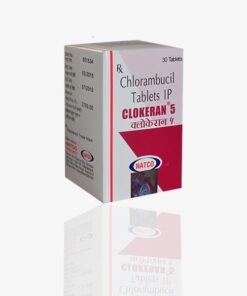Buy Paclitax : Paclitaxel 100 Mg Injection Online For Sale
$106.28
Brand Name : Paclitax
Composition : Paclitaxel
Manufactured by : Cipla Ltd.
Strength : 100 mg
Form : Injection
Packing : Pack of 1 Vial
Prescription Required *
Paclitax (Paclitaxel 100 Mg Injection) is a prescription medication used in the treatment of various types of cancer. It is administered intravenously and is available as a single-dose vial with a strength of 100 mg.
Composition:
Each Paclitax vial contains Paclitaxel as the active ingredient.
Uses:
Paclitax is primarily used in the treatment of breast cancer, ovarian cancer, non-small cell lung cancer, and Kaposi’s sarcoma. It works by interfering with the normal function of cancer cells, inhibiting their ability to divide and grow.
HOW TO USE:
Paclitax is administered intravenously by a healthcare professional in a hospital or clinic setting. The dosage and duration of treatment may vary depending on the individual’s condition, medical history, and their response to the medication. It is essential to follow the healthcare provider’s instructions while taking the medication.
Dosage:
The recommended dosage of Paclitax is determined by the healthcare provider based on the individual’s condition, medical history, and response to the medication.
Storage Conditions:
Paclitax vials should be stored under refrigeration between 2°C to 8°C (35.6°F to 46.4°F) until use. The vials should be protected from light and kept in their original packaging. The medication should not be frozen or shaken.
Mechanism of Action:
Paclitaxel, the active ingredient in Paclitax, works by disrupting the normal function of cancer cells. It inhibits the microtubules, which are essential for cell division, preventing the cancer cells from dividing and growing.
Precautions:
Before starting treatment with Paclitax, it is essential to inform the healthcare provider about any pre-existing medical conditions, including liver or kidney disease, heart problems, or allergies to any medications. It should not be used during pregnancy or while breastfeeding. It should be used with caution in individuals with low white blood cell counts.
Contraindications:
Paclitax is contraindicated in individuals with a known hypersensitivity to Paclitaxel or any of the inactive ingredients in the medication. It should not be administered to individuals with low white blood cell counts or severe liver or kidney disease.
Interactions:
Paclitax may interact with other medications, supplements, or herbal products being taken. It is important to inform the healthcare provider about all the medications and supplements being taken to avoid potential interactions.
Overdose:
In case of an overdose of Paclitax, immediate medical attention should be sought. Symptoms may include low blood pressure, numbness or tingling in the arms or legs, and confusion.
Side effects:
Common side effects of Paclitax may include nausea, vomiting, diarrhea, hair loss, and fatigue. Serious side effects may include severe allergic reactions, low white blood cell counts, and neuropathy. It is important to report any unusual or severe side effects to the healthcare provider promptly.
Be the first to review “Buy Paclitax : Paclitaxel 100 Mg Injection Online For Sale” Cancel reply
Related products
Anti Cancer
Anti Cancer
Anti Cancer













Reviews
There are no reviews yet.